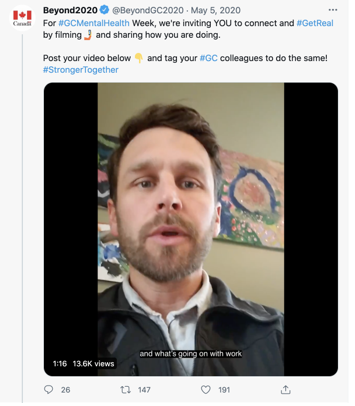Going #Beyond2020: Using Social Media to Put People First - Justin Mathews
By: Kayla Castro and Christine Jean-Baptiste

As the former Digital Communications Lead within the Public Service Renewal Secretariat at the Privy Council Office, Justin Mathews created the Beyond2020 blog as a space for public servants ‐ at all levels ‐ to share their stories and insights in advancing the Beyond2020 renewal agenda in their own words.
Justin saw the opportunity to bring the Beyond2020 framework’s three pillars- agile, inclusive, and equipped- to life within the blog by featuring the challenges, perspectives and journeys that public servants face. To increase awareness, these stories are then posted on social media, where they can reach all public servants and Canadians alike.
An example how of Justin used social media to communicate sensitive content is during Mental Health Week 2020. Challenged by executives to feature members of the Clerk’s Contact Group on Mental Health, the initial idea was a series of static Twitter cards. Instead, Justin proposed a video story that reminded viewers, it’s “okay to not be okay”. Using the Canadian Mental Health Association’s “Get Real” theme, Justin created a video featuring members of the Contact Group as well as a Call to Action inviting public servants to share their experiences as a reminder that “while we may be apart, we are not alone”. This led to public servants filming and sharing their own #GetReal stories on how they were doing in the wake of the pandemic across the country.

When sharing important content on social media channels Justin recommends plain language and putting people first.
“Social media is inherently a personal experience. With any initiative or agenda, we risk turning them into mere slogans on the wall. Buzzwords spoken by executives on panels that simply live and die on the dais. While it’s important for leadership to endorse these efforts, it’s equally important that public servants – at all levels - see themselves in the collective vision. Our story on IRCC’s Anti-Racism Task Force for example, was compelling not because it spoke to abstract goals but connected that work to Farah’s personal journey and the executive leadership that empowered her. Plain language makes that call-to-action that much stronger because it’s accessible to all – and what better way to avoid bureaucratic speak than getting it directly from the people at the heart of the story?”
Justin’s plain-language approach can be observed day in and day out on the Beyond2020 channels, from written social media content to video storytelling. His work on the Beyond2020 blog and social media channels not only embodies the Government of Canada’s Policy on Communications and Federal Identity principles, it also represents what it means to go beyond #Beyond2020. That is, a public service that is continuously committed to being an inclusive, accessible and forward thinking environment for all.
Follow the links below to view the #Beyond2020 renewal initiative and tips for using plain language:
Page details
- Date modified: